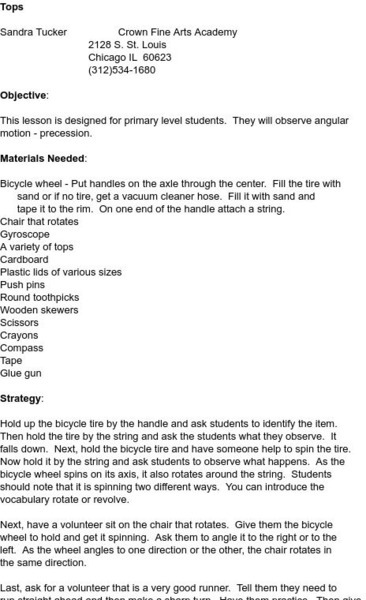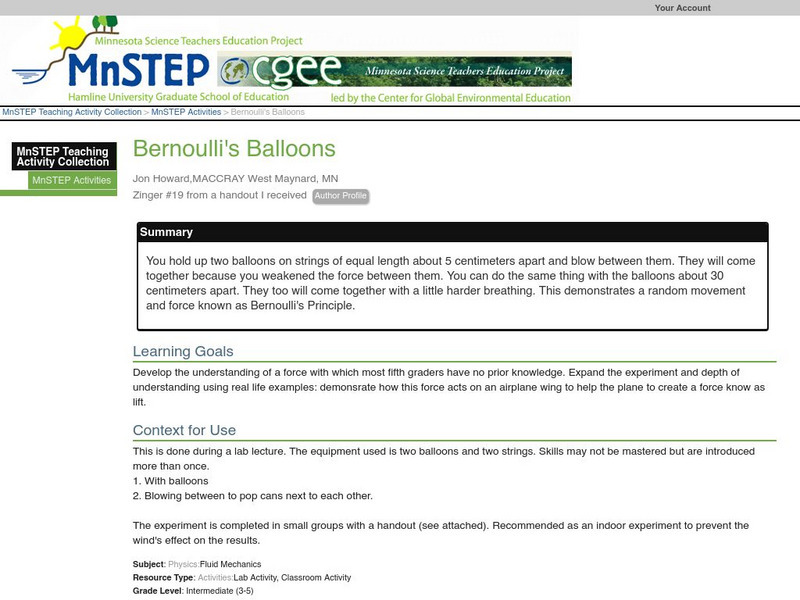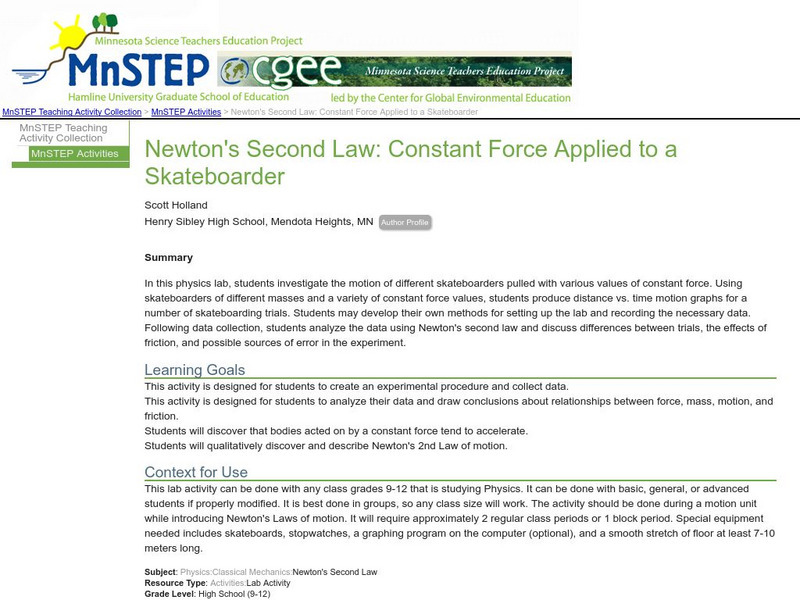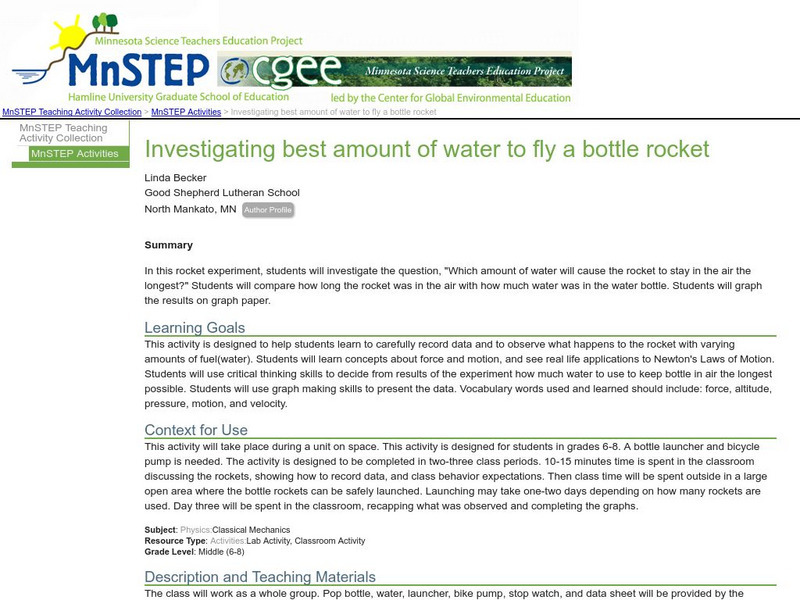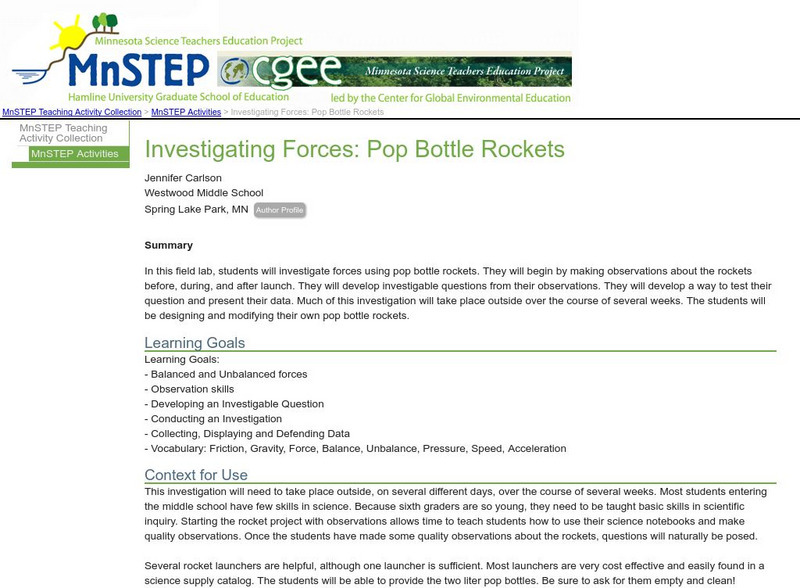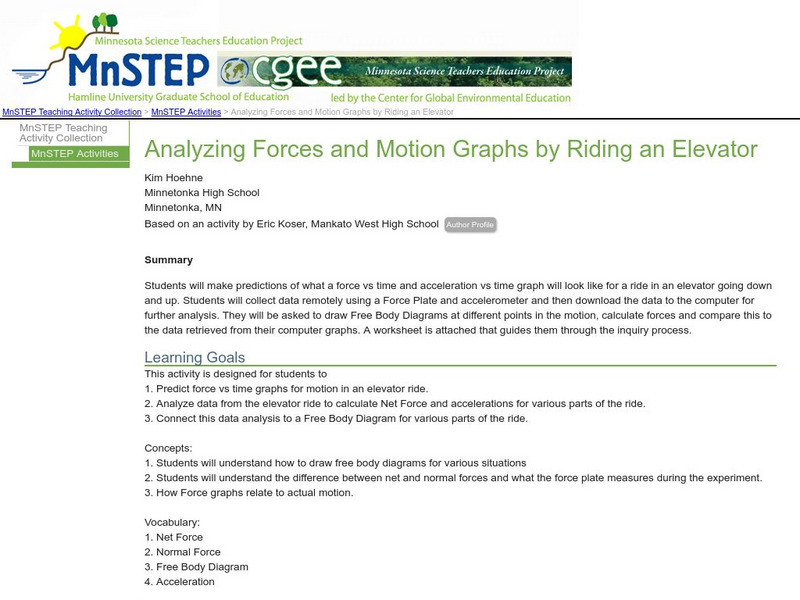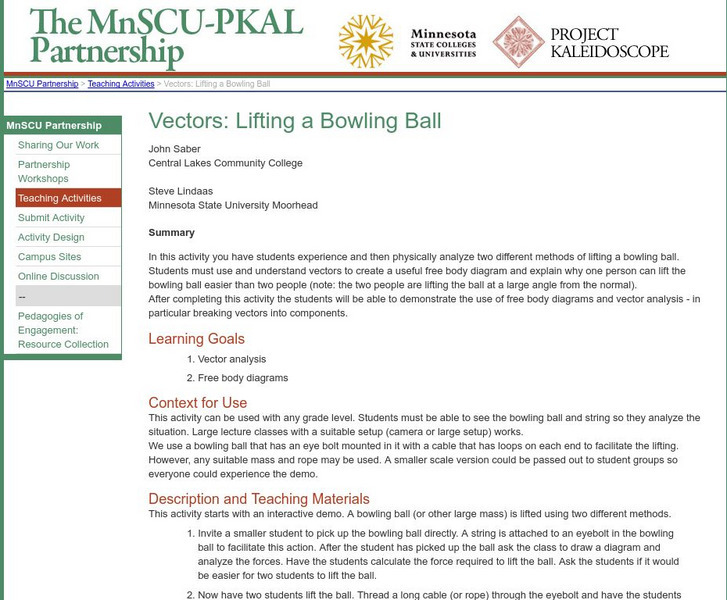Science and Mathematics Initiative for Learning Enhancement (SMILE)
Smile: Lab Activity: Tops
The Illinois Institute of Technology provides a lab activity on precession and spinning tops. Designed for primary grades, but easily adapted for any level. Includes directions and assessment ideas.
Science and Mathematics Initiative for Learning Enhancement (SMILE)
Smile: Four Air Pressure Labs
Four lab exercises from the Illinois Institute of Technology demonstrating air pressure are given.
Science Education Resource Center at Carleton College
Serc: Bernoulli's Balloons
You hold up two balloons on strings of equal length about 5 centimeters apart and blow between them. They will come together because you weakened the force between them. You can do the same thing with the balloons about 30 centimeters...
Science Education Resource Center at Carleton College
Serc: Newton's Second Law: Constant Force Applied to a Skateboarder
In this lab activity, students will become familiar with Newton's 2nd Law of Motion. By investigating the motion of different skateboarders pulled with a variety of constant force values, they will discover that bodies acted on by a...
Science Education Resource Center at Carleton College
Serc: Balanced Forces
In this activity the students will learn the scientific definition of force. The students will see different examples of forces on an object and will gain an understanding that there are at least two forces acting on an object at all...
Science Education Resource Center at Carleton College
Serc: Investigating Best Amount of Water to Fly a Bottle Rocket
In this rocket experiment, young scholars will investigate the question, "Which amount of water will cause the rocket to stay in the air the longest?" Students will compare how long the rocket was in the air with how much water was in...
Science Education Resource Center at Carleton College
Serc: Investigating Forces: Pop Bottle Rockets
In this lab, students will work on scientific inquiry skills: observation, developing questions, conducting an experiment, and collecting data. They will investigate forces using pop bottle rockets that they have designed.
Science Education Resource Center at Carleton College
Serc: Analyzing Forces and Motion Graphs by Riding an Elevator
A high school physics lab on classical mechanics in which young scholars study force versus time and acceleration versus time. Students need access to an elevator to complete the experiments. A lab handout is provided.
Science Education Resource Center at Carleton College
Serc: Marble Stop
In this two-part lesson, students will discover that no matter what the shape of the track, the marble will rise to the same vertical height. They will begin to understand the concepts of gravity, motion, and force.
Science Education Resource Center at Carleton College
Serc: Investigating Gravity: Predicting Time to Hit the Ground
Students will drop and shoot horizontally "Nerf" balls from a variety of known heights then record the amount of time it takes for the ball to hit the ground for each trial. They will plot height vs. time data and create a trend line for...
Science Education Resource Center at Carleton College
Serc: Investigating Projectile Motion: Creating a Catapult
This lesson is for 9th grade physical science students. It begins with an inquiry-based lesson using a projectile motion computer simulation. It culminates with students building a catapult; applying and connecting science knowledge from...
Science Education Resource Center at Carleton College
Serc: Determination of Boyle's Law Through Data Collection
Students develop an understanding of the mathematical relationship between pressure and volume of a gas. Students will practice data collection and graphing skills while also making the connection between force and pressure
Science Education Resource Center at Carleton College
Serc: Newton's Second: Having a Ball With Motion
Students will create a gravity ball launcher to demonstrate their understanding of mass, force, momentum, and motion. The students will use critical thinking, measurement, and observation and analysis of data to make changes and improve...
Science Education Resource Center at Carleton College
Serc: Investigating Inertia
In this investigation, learners will perform a simple ordering activity and demonstration to determine what inertia is and recognize how inertia affects objects. They will compare and contrast the masses of objects to predict the...
Science Education Resource Center at Carleton College
Serc: Investigating Motion: What Causes Objects to Move?
Students will have an opportunity to determine what makes everyday objects move. Students will be given objects and asked to make predictions on how far each object will move after they blow on it. Then they will measure the distance and...
Science Education Resource Center at Carleton College
Serc: Investigating Forces: Balloon Car Activity
In this activity, teams of students build a car out of common materials which is then propelled by the release of air out of a balloon and must travel a minimum distance. The activity is then extended to a competition to build the car...
Science Education Resource Center at Carleton College
Serc: Vectors: Lifting a Bowling Ball
Students experience and analyze two different methods of lifting a bowling ball. By using and understanding vectors, they create a useful free body diagram to explain why one person can lift the bowling ball easier than two people
Science Education Resource Center at Carleton College
Serc: Using Your Marbles: Making Energy Work for You
This activity is based on the common experiment of running a marble down a ramp to do work on a cup. Students will be able to see the relationship between mass and energy of the marble and the ramp height.
TryEngineering
Try Engineering: Give Me a Brake
Activity investigates the concept of how bicycle brakes use force and friction to stop or slow mechanical motion. Students work in teams to devise a simple braking system while suggesting improvements to current bicycle brake design.
TryEngineering
Try Engineering: Pulleys and Force
Students work in teams to learn how pulleys and pulley systems impact everyday life. This activity explores the concept of force and shows how the use of pulleys can greatly reduce required force.
Virginia Commonwealth University
Virginia Commonwealth University: Power Questions
Good use of linking to provide definitions of power along with examples and probing questions. Created by Robert H. Gowdy, physics instructor at VCU.
Wikimedia
Wikipedia: Centripetal Force
Wikipedia's site on centripetal force provides a section explaining the difference between centripetal force and centrifugal force. Includes formulas and hyperlinked terms.
Physics Games
Physics Games: Bubble Quod
You're in a bubble and that pointy thing in each level is your only ticket to freedom. Don't let any obstacles stand in your way!
Project Britain
Primary Homework Help: Forces Quiz
First, read some fast facts about forces, then take a ten-question, multiple-choice quiz. Check to see if your answers are correct after each question.


